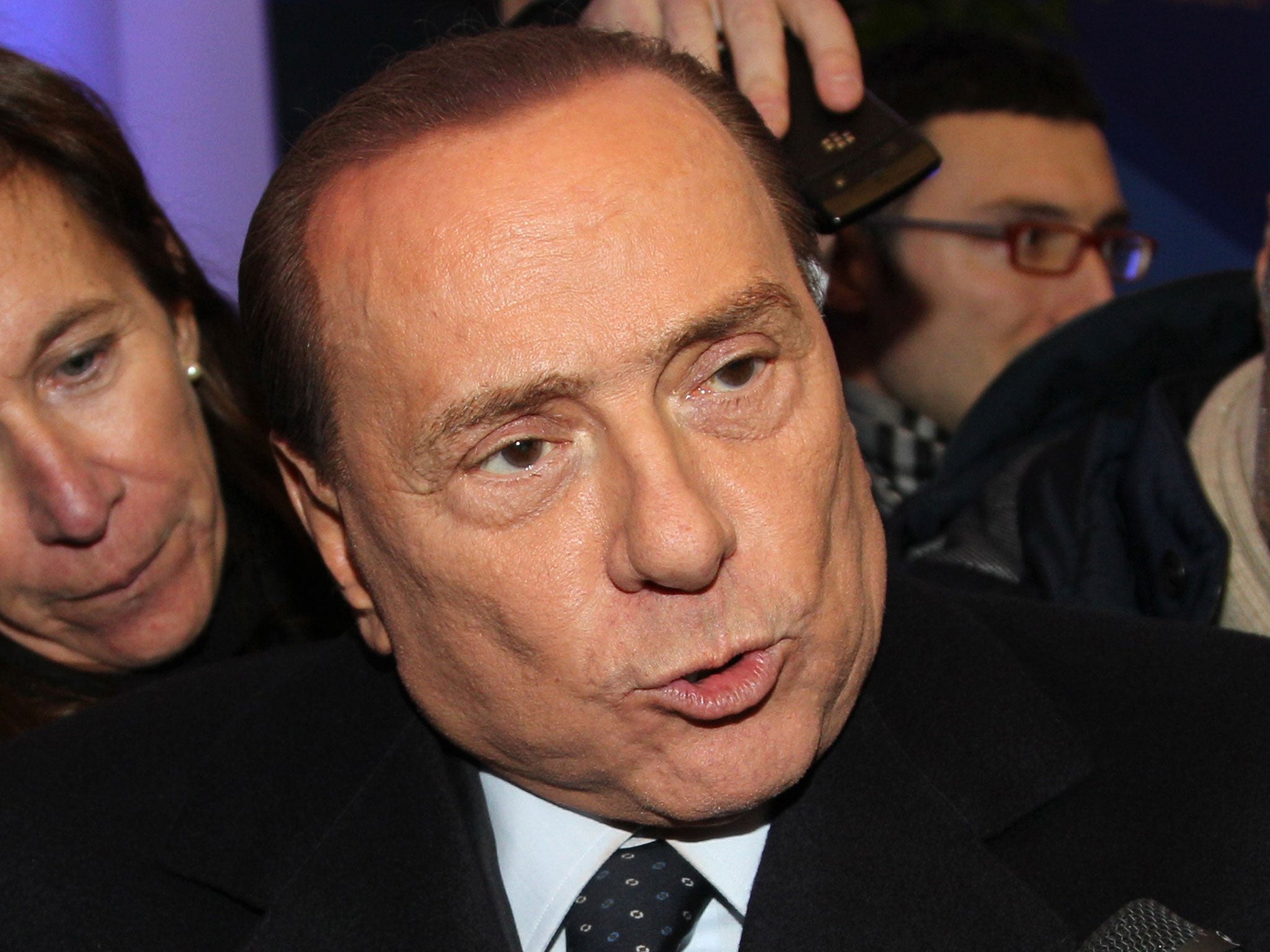Your support helps us to tell the story
From reproductive rights to climate change to Big Tech, The Independent is on the ground when the story is developing. Whether it's investigating the financials of Elon Musk's pro-Trump PAC or producing our latest documentary, 'The A Word', which shines a light on the American women fighting for reproductive rights, we know how important it is to parse out the facts from the messaging.
At such a critical moment in US history, we need reporters on the ground. Your donation allows us to keep sending journalists to speak to both sides of the story.
The Independent is trusted by Americans across the entire political spectrum. And unlike many other quality news outlets, we choose not to lock Americans out of our reporting and analysis with paywalls. We believe quality journalism should be available to everyone, paid for by those who can afford it.
Your support makes all the difference.Former Italian Premier Silvio Berlusconi praised Benito Mussolini for "having done good" despite the Fascist dictator's anti-Jewish laws, immediately sparking expressions of outrage as Europe today held Holocaust remembrances.
Berlusconi also defended Mussolini for allying himself with Hitler, saying his likely reasoning was that it would be better to be on the winning side.
The media mogul, whose conservative forces are polling second in voter surveys ahead of next month's election, spoke to reporters on the sidelines of a ceremony in Milan to commemorate the Holocaust.
In 1938, before the outbreak of the Second World War, Mussolini's regime passed the so-called "racial laws," barring Jews from Italy's universities and many professions, among other bans.
When Germany's Nazi regime occupied Italy during the war, thousands from the tiny Italian Jewish community were deported to death camps.
"It is difficult now to put oneself in the shoes of who was making decisions back then," Berlusconi said of Mussolini's support for Hitler.
"Certainly the government then, fearing that German power would turn into a general victory, preferred to be allied with Hitler's Germany rather than oppose it."
Berlusconi added that "within this alliance came the imposition of the fight against, and extermination of, the Jews. Thus, the racial laws are the worst fault of Mussolini, who, in so many other aspects, did good."
More than 7,000 Jews were deported under Mussolini's regime, and nearly 6,000 of them were killed.
Reactions of outrage, along with a demand that Berlusconi be prosecuted for promoting Fascism, quickly followed his words.
Berlusconi's praise of Mussolini constitutes "an insult to the democratic conscience of Italy," said Rosy Bindi, a centre-left leader.
"Only Berlusconi's political cynicism, combined with the worst historic revisionism, could separate the shame of the racist laws from the Fascist dictatorship."
Italian laws enacted following the country's disastrous experience in the war forbid the encouragement of Fascism.
A candidate for local elections, Gianfranco Mascia, pledged that he and his supporters will present a formal complaint tomorrow to Italian prosecutors, seeking to have Berlusconi prosecuted.
Advocating aggressive nationalism, Mussolini used brutish force and populist appeal evoking ancient Rome's glories to achieve and keep his dictatorial grip on power, starting in the early 1920s and lasting well into the Second World War.
His Fascist "blackshirt" loyalists cracked down on dissidents, through beatings and jailings.
He encouraged big families to propagate the Italian population, established a sprawling state economy and erected monumental buildings and statues to evoke ancient Rome.
Mussolini sought to impose order on a generally individualistic-minded people, and Italians sometimes note trains ran on time during Fascism.
With dreams of an empire, he sent Italian troops on missions to attack or occupy foreign lands, including Ethiopia and Albania.
Eventually, Italian military failures in Africa and in Greece fostered rebellion among Fascist officials, and in 1943 he was placed under arrest by orders of the Italian king. His end came at the vengeful hands of partisan fighters who shot him and his mistress, and left their bodies to hang in a Milan square in April 1945.
Berlusconi's former government allies have included political heirs to neo-fascist movements admiring Mussolini.
In 2010, he told world leaders at a Paris conference that he had been reading Mussolini's journals, and years earlier Berlusconi had claimed that Mussolini "never killed anyone."
Berlusconi is running in the February 24-25 Parliamentary elections and has repeatedly changed his mind on whether he is seeking a fourth term as premier.
Monti is also running, but polls put him far behind front-runner Pier Luigi Bersani, a centre-left leader who supported Monti's austerity measures to save Italy from the Eurozone debt crisis.
Polls show about one-third of eligible voters are undecided.
AP

Join our commenting forum
Join thought-provoking conversations, follow other Independent readers and see their replies
Comments